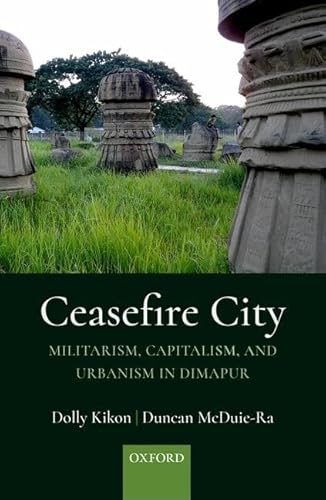Ceasefire City
Militarism, Capitalism, and Urbanism in Dimapur
Dolly Kikon; Duncan McDuie-Ra
BOOK REVIEW

In the heart of a nation torn by conflict, Ceasefire City: Militarism, Capitalism, and Urbanism in Dimapur emerges as a pivotal inquiry into the social fabric of Dimapur, a city that lives under an unceasing cloud of militarism and capitalism. Written by the insightful minds of Dolly Kikon and Duncan McDuie-Ra, this book is a profound examination that uncovers the intricate layers of urbanism shaped by decades of political turmoil and economic exploitation.
As you delve into the pages, you will encounter the dynamic interplay between militarism and capitalism-a relationship that not only defines the city but also resonates with broader global patterns. The authors dissect how the remnants of colonial governance intertwine with modern economic ambitions, forging a landscape where local identity is constantly at odds with overarching state interests. The narrative expertly exposes the paradoxes faced by residents, caught between the aspirations for development and the harsh realities of state control.
The authors invite you to experience the tumultuous milieu of Dimapur, where every street corner tells a story of resistance, adaptation, and survival. Through eloquent prose, they evoke the pulsating life of the city, allowing you to visualize bustling markets overshadowed by military presence. The emotional weight of their writing provokes a visceral reaction, compelling you to reflect deeply on the human cost of geopolitics in urban settings.
Replete with firsthand accounts, historical context, and sharp analyses, Ceasefire City does not shy away from exposing the gritty truth that underlies urban development in conflict zones. Readers will resonate with poignant narratives that speak to the resilience of Dimapur's people, whose voices have often been silenced in broader discourses on globalization and military influence.
Critics have lauded the book for its scholarly depth and passionate storytelling, yet some have challenged its focus, arguing that it occasionally veers into academic jargon that can alienate general audiences. However, those who persevere through these passages will find a treasure trove of insights that unravel the complexities of militarized capitalism. The authors' approach to contrasting local experiences with global theories ignites a firestorm of emotion, spurring a sense of urgency about the need for reforms that consider the lived realities of those most affected.
The echoes of their arguments extend far beyond the confines of Dimapur. They resonate with anyone grappling with the implications of militarism and capitalism in their own urban landscapes, making this read not just an academic exercise but a call to action. If you've ever felt the pangs of political disenfranchisement or wondered about the relationships between state power and economic systems, this book demands your attention.
Ceasefire City compels you to confront uncomfortable truths and sparks a crucial dialogue about the futures we envision for urban spaces caught in the crossfire of competing interests. As the last pages turn, the lingering questions may haunt you: What does it mean to live in a city where militarism intersects with economic ambition? How do we ensure that the voices of those most affected are heard?
Ultimately, Kikon and McDuie-Ra not only document the poignant realities of Dimapur; they challenge you, the reader, to rethink the implications of these narratives on your own city, your community, and your understanding of freedom and progress. This book is an emotional odyssey, an urgent plea for justice, and a beacon of hope amidst chaos. 🌍✨️
📖 Ceasefire City: Militarism, Capitalism, and Urbanism in Dimapur
✍ by Dolly Kikon; Duncan McDuie-Ra
🧾 284 pages
2021
#ceasefire #city #militarism #capitalism #urbanism #dimapur #dolly #kikon #DollyKikon #duncan #mcduie #DuncanMcDuieRa